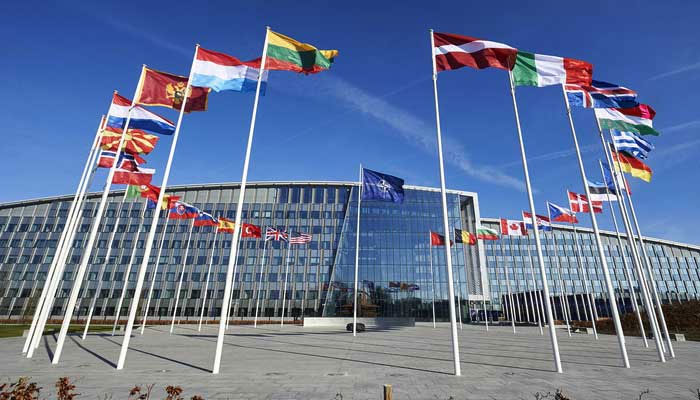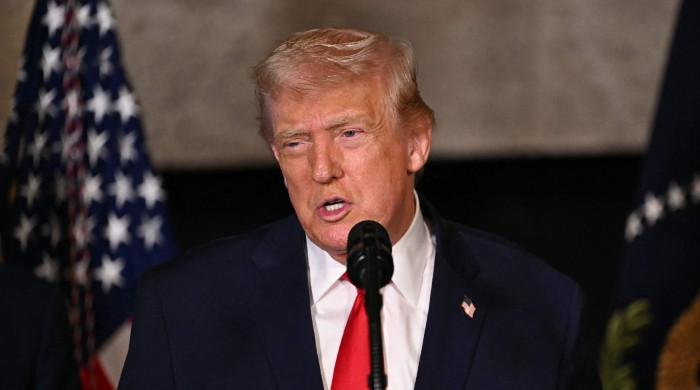Why are Turkey and Hungary against Sweden joining NATO?
Both countries see NATO, with its collective defence clause, as the best way to ensure their security
April 06, 2023

STOCKHOLM: Sweden's path to NATO membership remains blocked by Turkey and Hungary as neighbour Finland officially joined the 30-member alliance on Tuesday after its application was ratified in record time.
Analysts do not expect Turkey to ratify Sweden's application until after Turkey's May 14 election at the earliest. Even then, it is unclear what would trigger a change of heart by President Tayyip Erdogan. Hungary is seen following Ankara's lead.
Background
Russia's invasion of Ukraine in February last year convinced Sweden and Finland to ditch long-held policies of military non-alignment.
Both countries see NATO, with its collective defence clause, as the best way to ensure their security.
The majority of NATO members have quickly ratified their applications, arguing that Finland - which shares a 1,300-km (810-mile) border with Russia - and Sweden would strengthen the alliance in the Baltic.
After initial objections, the Turkish parliament gave its approval for Finnish membership last week.
But Turkey has dragged its heels over Sweden saying it does not take Ankara's security concerns seriously and has not lived up to its side of a bargain, struck in Madrid last year, that laid out a number of issues Stockholm needed to address.
Hungary has followed Turkey's lead in delaying ratification, which must be unanimous.
Why does Turkey object to Swedish NATO membership?
Sweden has criticised Turkey for human rights abuses and over democratic standards, irking politicians in Ankara.
Turkey says Stockholm harbours members of what it considers terrorist groups - a charge Sweden denies - and has demanded their extradition as a step toward ratifying Swedish membership.
Sweden's courts have blocked some expulsions.
In recent weeks, Turkey has objected to protests in Stockholm during which the Muslim holy book, the Koran, was burned and, on a separate occasion, an effigy of Erdogan was hanged upside down.
Ankara says these are hate crimes. Sweden says they are covered by freedom of speech laws.
Turkey holds an election on May 14, presenting Erdogan with his biggest political challenge during two decades in power. The NATO issue may help divert voters' attention away from a cost-of-living crisis.
An opposition win - a real possibility - would boost Sweden's chances of a quick accession.
Why was Hungary not ratified membership?
Hungary says Sweden has had a hostile attitude to Budapest for years. It is angry about Swedish criticism of Prime Minister Viktor Orban over the perceived erosion of rule of law. Orban denies such erosion. Unlike Turkey, Hungary does not have a list of demands but says grievances need to be addressed before it can ratify Sweden's accession to NATO.
When will Turkey agree to Swedish NATO membership?
Once the election is out of the way, Sweden's path may be clearer. But there is no timetable and approval is not guaranteed.
Sweden says it has implemented the Madrid agreement - including tougher anti-terrorism laws - and that some of Ankara's other demands are impossible to meet.
Turkey has had previous run-ins with NATO allies and backed down.
"Looking at those earlier incidents, they were resolved by pressure from allies, negotiations and some concessions from allies. My expectation is that the same could be achieved here," Paul Levin, director at the Institute for Turkish Studies at Stockholm University, said.
A shift could come after the election, or Erdogan may want to see further evidence from Sweden it has listened to Ankara's security concerns. "In that case, we are talking perhaps another few months after summer," Levin said. "But it is hard to predict."
Is Sweden’s security threatened by the delay?
Sweden has said its security position is better now than prior to its application to NATO. Sweden has received assurances of support from countries including the United States, Britain and Germany.
NATO Secretary-General Jens Stoltenberg has said it would be inconceivable that the alliance would not support Sweden if it were threatened.
Sweden already cooperates closely with NATO and integration measures are moving forward. Sweden has a strong air force and a submarine fleet tailored to Baltic Sea conditions - a boost for NATO in the region.









